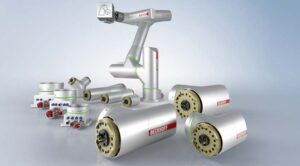Modular Robots can bring extreme flexibility in any manufacturing system
December 2, 2022 11:31 am
PC based Control and modular robots reduces cost of robotization The direct benefit of AI, ML-based automation enables manufacturers to monitor machines and production processes in real-time, improve efficiencies and reduce the cost of goods.
Industrial robotics will continue to be used in welding, material handling, assembly automation, surface coating-painting, packaging and cartoning applications.
Demand for IoT, AI and robotics integration for manufacturing
The direct benefits of AI, ML and IoT are that manufacturers can monitor their machines and production processes in real-time, improve efficiencies, reduce the cost of goods produced substantially, and minimise the downtime of production machines and systems. Considering current KPI data, one can estimate the possible applicability of these technologies to forecast deliveries, predict disruptions, find inefficient processes, and improve. Robotic technology and devices can be implemented in appropriate processes considering cost vis-a-vis output. It is important to have seamless real-time connectivity between Central controllers and different device controllers, machine controllers and robot controllers, without which AI-ML-based smart automation cannot be implemented.
Managing robotisation with safety practices
Safety audits should be done mandatorily where robotisation is implemented. Similarly, training and awareness creation within the shopfloor teams are essential. Before robotisation, assessing the presently deployed manual processes and the repetitiveness of operations, accuracy deviations due to manual handling, operator fatigue and safety concerns, the prevailing market situation, demand sustainability and the future expected production volume could be considered as inputs to decide the strategic implementation of robotisation by the manufacturer.

Challenges in implementing Industry 4.0
Industry 4.0 has hardly penetrated SMEs because of a lack of clarity among the boardroom members about the tangible benefits of industry 4.0 concepts and the absence of a roadmap. Industry 4.0 starts with implementing basic automation of machines installed in manufacturing facilities and enabling data exchange connectivity between different manufacturing systems and subsystems, which is absent in most SMEs’ facilities. Lack of initiative to modernise the shopfloor through new investment decisions is also why. The poor business sustainability and prospects are another reason not to think about Industry 4.0.
5G impact manufacturing processes
5G implementation will encourage SMEs to implement automation and Industry 4.0. The results of data acquisition and analytics will be more visible and convincing. Successful manufacturing automation gives the management the time to think about business growth rather than addressing production and people issues.
Automated Guiding vehicles and machine functionalities
Safe Handling of products and the raw material is the most challenging aspect of manufacturing. AGVs can play a crucial role in overcoming them. Smarter AGVs are available with full automation. Consistent integration of all machine functionalities in one control platform is critical. Seamless system integration with cameras, optics, illumination, complete units, and software will enable machine designers to bring in more efficiencies. Vision automation should be treated equally to machine automation.
Cookie Consent
We use cookies to personalize your experience. By continuing to visit this website you agree to our Terms & Conditions, Privacy Policy and Cookie Policy.



















 English
English Hindi
Hindi